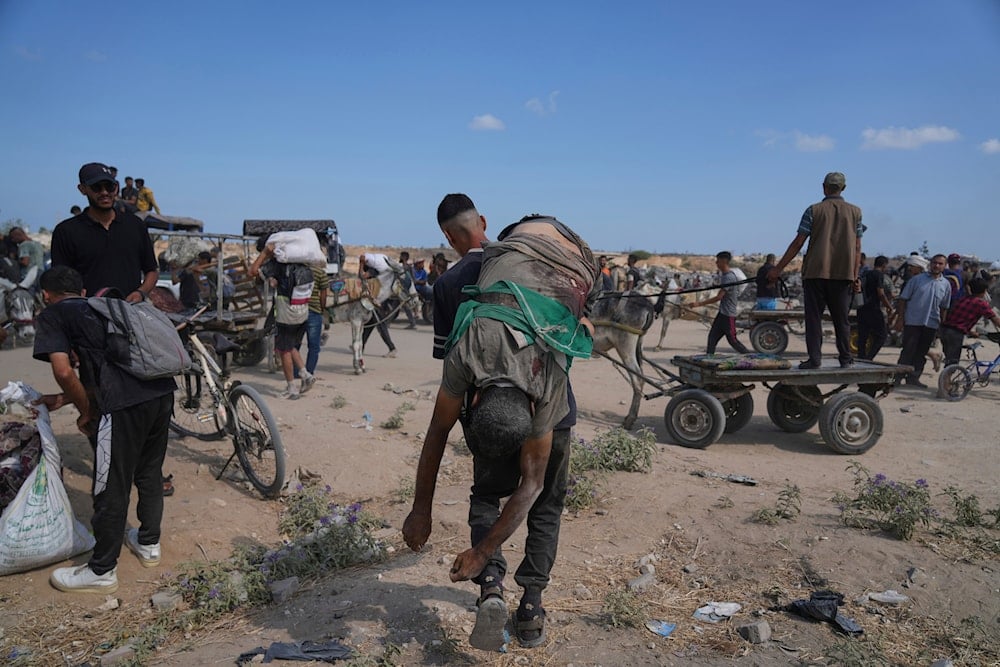US mercenary firm, tied to GHF, recruiting for redeployment in Gaza
UG Solutions is recruiting ex-soldiers for security roles in Gaza amid Trump-led stabilization efforts, following deadly incidents near aid sites.
-

A Palestinian carries the body of a man killed while trying to receive aid near a distribution center operated by the US-backed Gaza Humanitarian Foundation (GHF) in the Netzarim Axis, in the Gaza Strip, Aug. 4, 2025 (AP)
An infamous American private military firm, known for its past involvement in violent incidents at aid distribution sites in Gaza, is actively recruiting former soldiers for a new deployment to the blockaded Palestinian territory, Drop Site News reported.
UG Solutions, a US-based military subcontractor previously contracted to provide security for the contentious Gaza Humanitarian Foundation (GHF), is ramping up recruitment for roles it describes as “robust security” positions in Gaza.
The company reportedly plans to establish up to 15 new aid distribution sites as part of a broader initiative under President Donald Trump’s proposal for an international stabilization force.
A former US Army officer who interviewed for a position with UG Solutions said the firm intends to deploy recruits by December. Contracts are said to offer up to $1,000 per day for armed guard duties. Candidates were reportedly told that the mission would involve providing security at Gaza aid zones. Internal emails obtained by Drop Site News suggest the company is prequalifying candidates for operations in “high-threat environments".
The recruitment drive comes in the wake of the UN Security Council’s November 17 resolution authorizing an international stabilization force in Gaza. However, the force will operate independently of the UN and report to a new body called the “Board of Peace,” chaired by President Trump, which has been granted authority over Gaza’s security, reconstruction, and humanitarian operations.
Jennifer Counter, UG Solutions’ vice president of government affairs, confirmed that the firm is “preparing for a wide range of scenarios,” including “a robust security presence in support of humanitarian aid delivery,” and noted that discussions with relevant stakeholders are ongoing.
2,600 Palestinians killed near GHF distribution sites
The Gaza Humanitarian Foundation (GHF) was established in early 2025 as a US- and “Israel”-backed mechanism purportedly aimed at delivering humanitarian aid to the Gaza Strip amid a severe blockade and food crisis.
The model diverged sharply from traditional humanitarian operations: rather than partnering with the United Nations Relief and Works Agency (UNRWA) or large humanitarian NGOs, aid delivery through GHF was to be concentrated in a few sites, heavily guarded by private security contractors, and subject to screening measures.
Human rights organizations, including Doctors Without Borders (MSF) and the Office of the United Nations High Commissioner for Human Rights (OHCHR), have accused GHF’s aid hubs of being unsafe for civilians, structurally biased, and even complicit in violence, noting that large numbers of Palestinians have been killed or wounded while seeking aid at GHF-run sites.
Between May and October, 2,600 Palestinians killed
Between May and October, during GHF operations in Gaza supported by UG Solutions contractors, more than 2,600 Palestinians were killed and over 19,000 were injured at or near aid distribution sites. Video evidence and eyewitness accounts indicate that guards employed by UG Solutions used live ammunition and stun grenades while managing aid distribution.
Anthony Aguilar, a former UG Solutions contractor, resigned in protest over the company’s actions, describing the aid distribution sites as “death traps” and accusing the firm of engaging in serious abuses.
Meanwhile, reports suggest that "Israel" has introduced a series of measures aimed at further fragmenting Gaza. These include expanded mobile phone access, restrictions on cash flow, and financial penalties targeting Palestinian banks. Analysts contend that these steps form part of a broader strategy to restructure Gaza’s economy and society through digital systems and surveillance mechanisms.
The reconstruction plan reportedly targets eastern Gaza, the area hardest hit during the genocide. Rebuilt zones would be under tight Israeli oversight, controlling movement, trade, and finances, with only Israel-approved merchants able to operate and all transactions handled via digital credit systems.

 4 Min Read
4 Min Read











